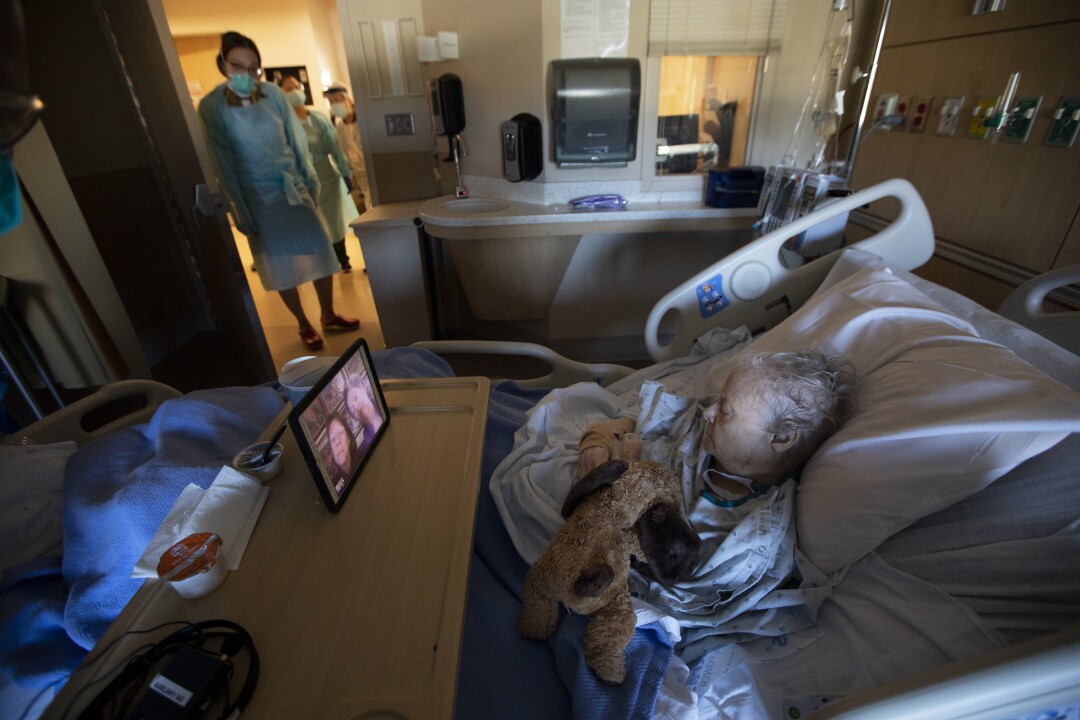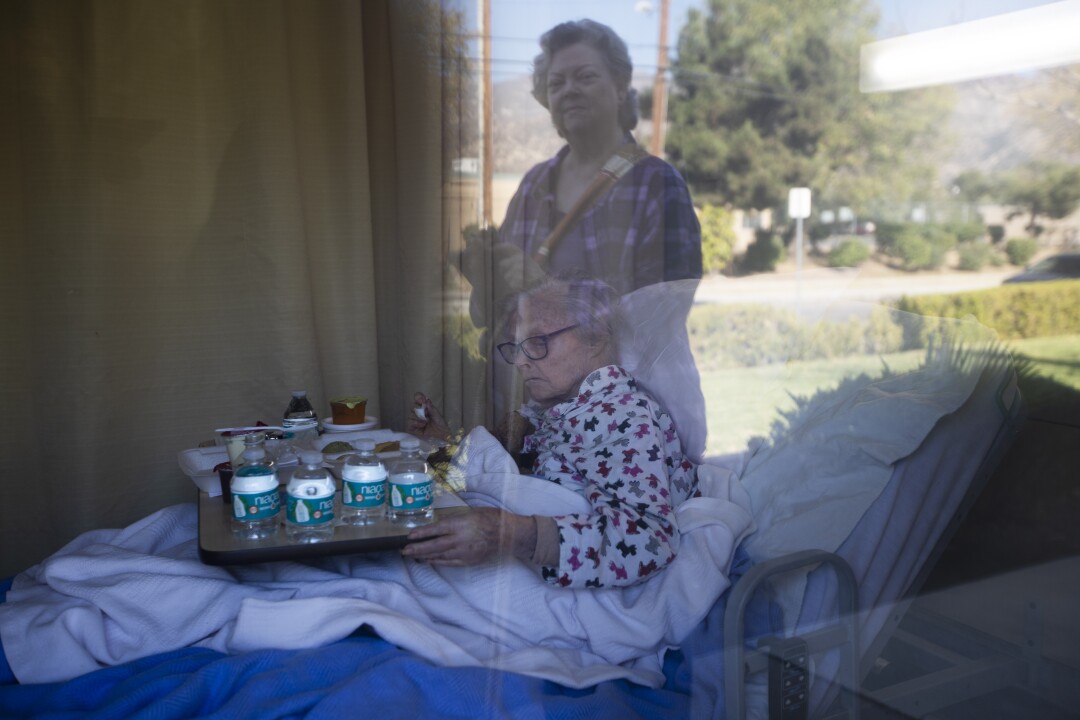[ad_1]
They wrote their promises in big block letters on a portable chalkboard and held it up to the nursing home window:
WE WILL BE BACK TOMORROW.
WE ARE BUYING YOUR FAVORITE FOODS!
YOU ARE COMING HOME.

Marjorie Leach’s daughters Kathleen Hill, left, and Laura Leach-Palm visit their mother, who was in quarantine after being diagnosed with COVID-19.
(Francine Orr / Los Angeles Times)
The tiny woman on the other side of the glass was busy eating pudding from the tray in front of her, but she nodded at the messages and the smiling women who held them up. She was dwarfed by the hospital bed, swimming in a pair of white pajamas printed with black, gray and red Scottish terriers.
You wouldn’t know it from looking at her, but Marjorie Leach belongs to one of the most exclusive clubs around, women and men whose mere existence warrants breathless headlines across the globe. Dues are high, membership requirements stiff: You must be at least 100 years old. And you must have survived COVID-19.
Leach belongs, and she has definitely paid. Even though she was largely free of virus symptoms, the 101-year-old retired bookkeeper bounced back and forth between hospitals and nursing homes for three months.

Dr. Marwa Kilani, medical director of palliative care at Providence Holy Cross Medical Center, strokes Marjorie Leach’s hair. Leach was in the hospital’s COVID ward and had not seen her family members in person for three months.
(Francine Orr / Los Angeles Times)
But on this bright Thursday in mid-December, her daughters were preparing to bring her home.
In time for Christmas. And a new year with a new president — she voted by absentee ballot for Joe Biden. And yet another birthday. On Jan. 5, she will turn 102. To celebrate, she wants vanilla ice cream and sliced strawberries.
The frail centenarian’s experience underscores two brutal truths about COVID-19, which has killed more people 85 and older than any other segment of the population and ravaged nursing homes throughout the country.
As the pandemic drags on, hospitals are seeing more patients like Leach, who were admitted for other ailments but ended up in COVID wards because they happened to be infected.

Marjorie Leach, 101, speaks with with her daughters over an iPad. COVID-19 “displaced her from her loved ones,” said Dr. Marwa Kilani, medical director of palliative care at Providence Holy Cross Medical Center.
(Francine Orr / Los Angeles Times)
And even though the elderly woman did not test positive until Dec. 1 and has largely avoided COVID-19’s worst direct effects — the scarred lungs, the shortness of breath, the coughing, the blood clots, the loss of taste and smell — its indirect impacts have taken a terrible toll.
Especially the isolation.
COVID-19 “displaced her from her loved ones,” said Dr. Marwa Kilani, medical director of palliative care at Providence Holy Cross Medical Center. Kilani cared for Leach during two stays at the Mission Hills hospital — one for a broken hip, the other for a kidney infection.
“It was a one-two punch for her,” Kilani said. If the pandemic had not happened, “she may have just broken her hip, bounced back, went to rehab for a bit and gone back to the time when she would wake up, go for the [television] remote and start her day.”

Marjorie Leach, a 101-year-old COVID survivor, eats lunch in a Sylmar nursing home, where she’d been in quarantine. When her daughters Kathleen Hill, pictured, and Laura Leach-Palm visited, they had to stay outside the facility.
(Francine Orr / Los Angeles Times)
Kilani thought about loneliness, a byproduct of COVID-19. She wondered whether it might shorten Leach’s life. She struggled for words. Then her answer came quickly.
“I’d put money on it.”
Leach moved in with her daughter, Kathleen Hill, in 2004. They live with Hill’s daughter Marguerite in a cream-colored ranch house on a leafy street in Granada Hills.
Leach would get herself up in the morning, get dressed, brush her teeth, brush her hair. Then she’d grab her walker, head to the living room, find the remote control and switch on CNN. Until her eyesight worsened and she began to have mild dementia, she would knit and paint western scenes — cowboys and American Indians in oils.
Leach, her late husband and a couple of friends owned a “record, television and hi-fi store” in Indio, where she kept the books, Hill said. They also repaired electronics, because “back in the day, you didn’t throw things away.” She has three children, loves television and crossword puzzles.

Kathleen Hill, right, prepares to take her 101-year-old mother Marjorie Leach home from a skilled nursing facility in Sylmar.
(Francine Orr / Los Angeles Times)
“She’s had short-term memory issues for at least 10 years,” Hill said. “It’s like someone followed her with an eraser, and everything was gone. … But you could talk to her, have an intelligent conversation. There was no loss to her intellect.
“If we watched ‘Jeopardy!’ or ‘Wheel of Fortune,’” Hill added, “she’d guess the answers to the puzzles often before anyone else did. She was in the moment.”
And then, in late August, she was using her walker and reaching for the remote when she overbalanced and fell on her left hip. Hill called 911. An ambulance took Leach to Holy Cross.
Surgery repaired the damage. Leach began to heal. She was transferred to a rehabilitation center. That’s where things began falling apart.
“I would lead with, ‘Mama, guess what? The Dodgers won the World Series!’ Her face would light up. She’d make a little, ‘Oh!’ face. She was obviously excited. She was very happy.”
Kathleen Hill, daughter
She contracted a kidney infection. Her roommate tested positive for the coronavirus. Leach tested negative and was moved to an isolation room. The infection worsened. She returned to Holy Cross.
On Dec. 1, she got the bad news: she, too, was positive for the coronavirus.
Three days later, she was well enough to be discharged from the hospital. But because she had COVID-19 and was under strict quarantine orders, her rehab facility would not take her back.
And she couldn’t quarantine at home, because Hill and her daughter are among those most at risk for the coronavirus. The 73-year-old has heart problems and diabetes. Marguerite, 42, has thyroid cancer and is immunocompromised.

Weak but determined, Marjorie Leach, 101, gets into her daughter’s car.
(Francine Orr / Los Angeles Times)
Enter nursing home No. 2, Mountain View Convalescent Hospital in Sylmar, where Leach stayed until she was out of quarantine.
Hospitals and nursing homes had strict no-visit rules to help stanch the spread of the disease. In all, the elderly woman was largely separated from her family for more than three months.
Her only familiar companion was a stuffed dog named Poofey Woo. From institution to institution, she held on to the scruffy creature for dear life.
Hill would sometimes intercept her mother when the nursing home took her to a doctor’s office for an appointment. But she figures she saw Leach in person only four brief times in three months.
“On one of those visits, I brought her ballot,” Hill recounted. “I said, ‘Mom, do you want to vote?’ She said, ‘No.’ I said, ‘Mom, do you want to make changes to the government?’ She said, ‘Yes.’”
Hill read the names: Donald J. Trump. Joe Biden. Leach, a self-described yellow-dog Democrat, put her finger on her candidate of choice. The next time Hill visited her mother through the nursing home window — and the time after that — she reported the election results.

Marjorie Leach, 101, is going home. Her daughter Kathleen Hill is at the wheel. Leach had been separated from family for three months because of the pandemic.
(Francine Orr / Los Angeles Times)
“It was good news a couple of times in a row,” Hill said.
Because of her dementia, Leach would not remember the conversations. So Hill would remind her each time that Biden had won, and each time Leach would give her a thumbs up.
There was one other piece of repeated news that had the same effect.
“I would lead with, ‘Mama, guess what? The Dodgers won the World Series!’ Her face would light up. She’d make a little, ‘Oh!’ face. She was obviously excited. She was very happy.”

Marjorie Leach holds her stuffed animal Poofey Woo and her favorite blanket.
(Francine Orr / Los Angeles Times)
But those good times were the exception. Over the lengthy separation, the older woman began to withdraw. She lost strength and mobility. She got angry when nurses tried to wake her up.
Hill blames the combined insults of illness and isolation.
“If there wasn’t COVID and she broke her hip, we could go and sit with her all day,” Hill said. “We’d go in shifts. I’d go in for a while, and my sister would go in for a while. That emotional support makes a big difference. COVID just takes that away.”
But 11 days before Christmas, Leach’s long exile came to an end.
Just after 12:30 p.m. on Dec. 14, Hill and her sister, Laura Leach-Palm, drove up to the low-slung tan nursing home in the shadow of the San Gabriel Mountains.
Before leaving home, they had turned the back seat of the black Honda SUV into a comfortable nest. There was a pillow encased in white flannel and printed with dogs in holiday gear — antlers, scarves, Christmas sweaters. Leach’s favorite blanket, sky blue and white fleece with a snowflake pattern, was folded neatly on the seat.

Marjorie Leach’s granddaughter, Marguerite Hill, left, pushes her up a ramp as Marjorie’s daughter Laura Leach-Palm, right, assists.
(Francine Orr / Los Angeles Times)
A nurse rolled Leach out in a wheelchair. She wore bright red pajamas and purple fleece socks. Her hair was wispy and white. She clutched Poofey Woo on her lap.
Hill: “Guess how many days until you go home?”
Leach, pausing to think: “Two?”
Hill: “Zero! You’re going home!”
Leach: “Right now? Oh, boy. Goody, goody.”
Because Leach has been inactive for so long, she cannot stand or walk or even sit up without help. Getting her from wheelchair to car was a lengthy ordeal, the cozy back seat an impossibility. The drive home was slow and careful, the trip from car to wheelchair another delicate operation.
Hill watched Marguerite roll Leach up a ramp and into the house.
“I told the nurse before we left the nursing home, ‘Not everybody who comes here gets to go home,’” she said. She was pensive but happy.
“We’re lucky kids,” she said. “We get our mom. It’s a great Christmas present.”
[ad_2]
Source link